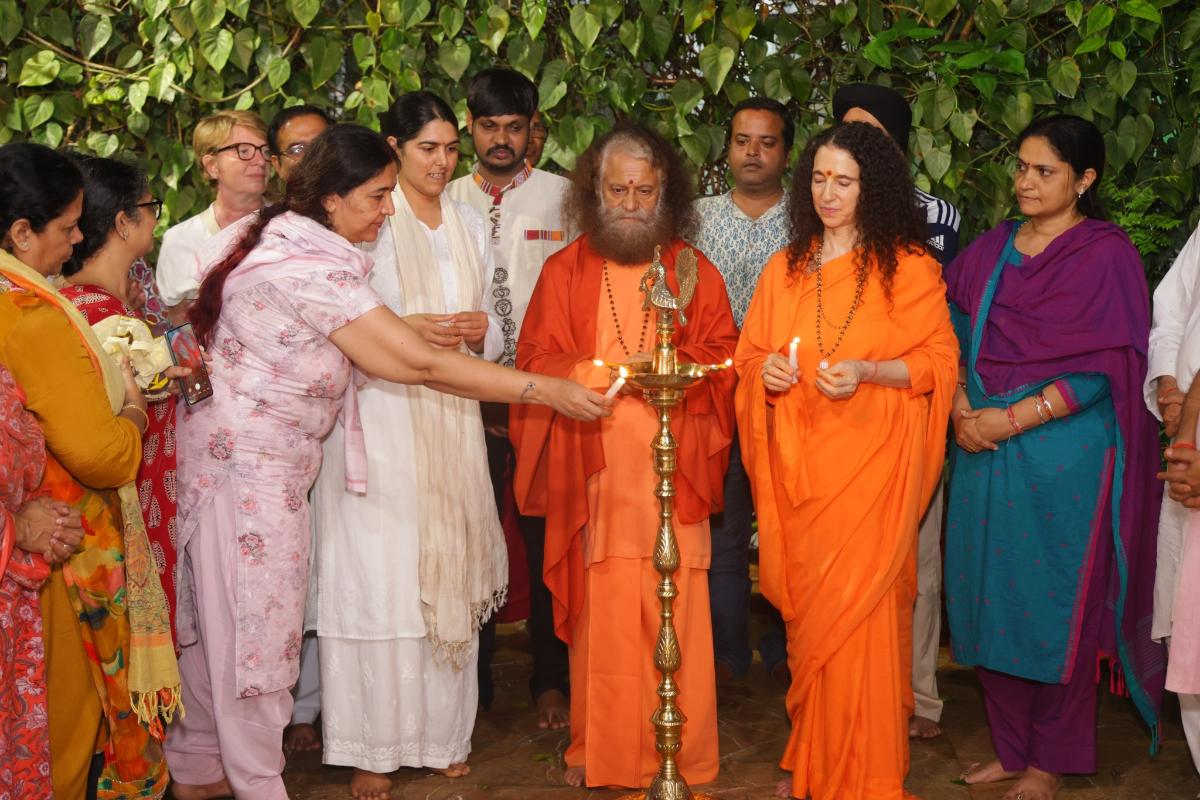
Parmarth Niketan Ashram inaugurated a two-day workshop of the Multi-Faith Action Coordinating Committee (MFACC) — a unique national-level advisory platform bringing together diverse faith leaders, interreligious councils, development partners, civil society, and community leaders to guide and support government priorities in service of the nation’s children and families.
This inauguration is especially auspicious as it coincides with Vishwakarma Jayanti — a day when artisans across India honor their tools. For faith leaders, the greatest tool is the power of dialogue — a means to build bridges across cultures, religions, and communities. On this occasion, MFACC honors and strengthens this sacred tool of dialogue as a way of living the truth that we are one humanity, rooted in the timeless Indian value of Vasudhaiva Kutumbakam — the world is one family.
At a time when devastating floods are impacting communities in the Himalayas and Punjab, this gathering of faith leaders stands in solidarity with those affected and rededicates itself to climate action. By coming together in Rishikesh during the sacred rains of the Himalayas, the MFACC embodies both prayer and action — uniting voices of faith to protect the planet and reverse climate change.
“Just as artisans honor their tools on Vishwakarma Jayanti, let us honor our greatest tool as faith leaders — the power of dialogue. Dialogue enables us to transcend boundaries, guide our leaders with wisdom, and unite for the future of our children and planet,” said Pujya Swami Chidanand Saraswati Ji, Co-Founder and Chair of the Global Interfaith WASH Alliance.
“This is not just a workshop; it is the strengthening of MFACC as a national advisory group — where faith leaders guide government, development partners, and civil society with unity of purpose. Together we can ensure that every child thrives and that India shines as a model of sustainable, compassionate development,” said Pujya Sadhvi Bhagawati Saraswati Ji, Secretary-General of GIWA and President of the Divine Shakti Foundation.
“Faith leaders hold a unique trust and influence within communities. Through the MFACC, this trust is being shaped into a national advisory platform that strengthens collective action for children’s health, nutrition, and wellbeing. UNICEF is honored to partner in this important effort,” said Sylvie Chamois, Nutrition Specialist UNICEF India.
Highlights of the Two-Day Agenda
Over the two days, the workshop focuses on capacity building, dialogue, and joint strategy development for faith-based organizations. Sessions include:
- Day 1: Inaugural prayers and blessings; introductions to the purpose, structure, and guiding principles of MFACC; plenary discussions on the role of faith in promoting health, nutrition, education, and climate resilience; and working groups exploring alignment with government priorities.
- Day 2: Training sessions on social and behaviour change communication; mapping of community assets; developing faith-based action plans; and co-creating a roadmap for MFACC’s advisory role at both national and state levels. The day concludes with reflections and collective commitments from all participants.
A special session on nutrition and healthy lifestyles emphasized practical, faith-led ways of strengthening families and communities. Six key messages were highlighted:
- Home-Cooked Food – No junk/packaged sugary foods or drinks. Eat a rainbow of diverse, local, and seasonal food.
- Together at the Table – No one should eat last and least, especially girls and women.
- Breastmilk ONLY – Within the first hour of birth till six months, give breastmilk only.
- Starting Solids Right – From six months, add soft, diverse, home-cooked food along with breastmilk until two years and beyond.
- Special Diets for Special Times – Underweight, anemic, teenage girls, pregnant and breastfeeding women may need extra meals; consult a professional.
- Beyond Screens – Exercise, movement, and play every day are essential for a healthy lifestyle.
Organisations Participating
The workshop brings together a broad coalition of faith-based and development partners, including UNICEF India, the Global Interfaith WASH Alliance (GIWA), Parmarth Niketan, Caritas India, the Brahma Kumaris, the Swaminarayan Gurukul Parivar, the Global Peace Foundation, Harijan Sevak Sangh, Mahavir Seva Sadan, Delhi Gurudwara Bangla Sahib, Punjab University, and the Divine Shakti Foundation, among others. Together, these organizations reflect the diverse moral and spiritual traditions of India united for the wellbeing of children and families.
About MFACC
Convened by the Global Interfaith WASH Alliance (GIWA) with UNICEF India, the Multi-Faith Action Coordinating Committee (MFACC is a voluntary, values-driven advisory committee designed to guide government, development partners, and civil society on faith engagement for national development priorities.
MFACC acts as both a multi-faith think tank and coordination mechanism, bridging spiritual wisdom with technical expertise to advance child survival, health, nutrition, WASH, education, climate resilience, and protection.
Its objectives are to:
- Advise government and partners on integrating faith-based perspectives into national agendas and programmes.
- Guide collective action by developing shared visions and joint planning among diverse faith leaders, FBOs, UNICEF, and development agencies.
- Promote inclusion by amplifying tribal, local, and underrepresented faith voices.
- Mobilize faith communities to support the most vulnerable and ensure last-mile service delivery.
- Enhance evidence and learning on culturally grounded approaches to sustained behaviour change.
